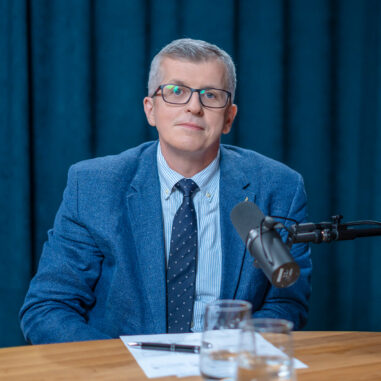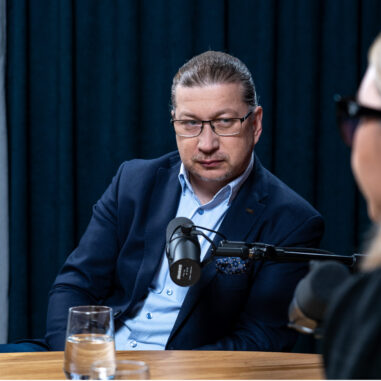
Bariatric surgery or how gastric reduction combats obesity. Episode 41
When diets fail and pharmacotherapy does not work, many people wonder what other options they have available to them in the fight against obesity. In the latest episode of the programme "Po pierwsze Pacjent" (First Patient), Monika Rachtan, together with Professor Wiesław Tarnowski, MD, PhD, head of the Clinical Department of General, Oncological and Bariatric Surgery at the W. Orłowski Hospital in Warsaw, delve into the secrets of bariatric surgery, which is becoming a last resort for many obese patients.
Obesity
Obesity has become one of the most serious health challenges of our time, affecting an increasing proportion of the population. "If we were to consider all causes of death in the world, obesity is in fifth place, according to the WHO," emphasises Professor Wieslaw Tarnowski, MD, PhD. In Poland, 65.7% men and 45.9% women are overweight, with obesity found in 15.4% men and 15.2% women. Giant obesity, or a BMI of equally 40 or more, affects 0.5% men and 0.4% women. These figures demonstrate a huge health problem and the need for preventive and curative action.
Obesity is classified into three grades according to body mass index (BMI):
- BMI over 30 - first degree obesity,
- BMI over 35 - grade II obesity,
- BMI over 40 - grade III obesity, also known as giant obesity.
Everyone can easily verify whether they are obese, simply by standing on a scale and using an online BMI calculator.
BMI calculator - https://www.nfz-krakow.pl/dla-pacjenta/zalatw-sprawe-krok-po-kroku/kalkulator-bmi/
Bariatric surgery
Bariatric surgery is a key solution for people struggling with obesity for whom other treatments have proved ineffective. A guest on the episode confirms that thanks to modern surgical techniques, such as laparoscopic surgery, the risk of complications is minimal and patients can look forward to sustained and significant weight reduction.
Among the methods of bariatric surgery, several methods of surgery can be distinguished, e.g:
-
- Laparoscopic sleeve gastrectomy,
- Laparoscopic gastrointestinal bypass,
- Laparoscopic gastric band placement.
Each aims to reduce body weight and improve control of the diseases that accompany obesity. These operations differ in their mechanisms of action, effects and potential complications.
Sleeve gastric surgery, which involves removing part of the stomach, resulting in a reduction in the amount of food consumed and changes in the body's response to food, is particularly popular. Professor Wieslaw Tarnowski, MD, reports that, thanks to the use of special staplers, the process is safe and effective, and the staples left in the body, made of titanium, do not pose a health risk to the patient.
These treatments make significant changes to the way the body processes food and regulates hunger, which has a direct impact on controlling obesity and its complications. A guest on the episode highlights the decrease in levels of ghrelin, the hunger hormone, which directly translates into a reduction in appetite.
The decision to choose a specific surgical method is made jointly by the patient and surgeon, taking into account the individual's needs, condition and expectations to ensure the best possible treatment outcome.
Indications
Indications for bariatric surgery include patients who, despite attempts at pharmacological treatment and lifestyle changes, have not achieved sustained weight reduction. They are recommended for people between 18 and 65 years of age. According to the guidelines of the Polish Society for the Treatment of Obesity and the Polish Surgical Society, patients with:
- grade III obesity,
- grade II obesity when accompanied by serious health complications such as type 2 diabetes, hypertension, sleep apnoea syndrome, which can be significantly improved by weight reduction.
Patients interested in bariatric surgery should start their pathway by visiting their GP, who can make a referral to a surgical clinic or a centre specialising in the surgical treatment of obesity. The process, as Professor Wieslaw Tarnowski, MD, explains, is well organised and involves interdisciplinary pre-operative care, including a comprehensive health assessment, optimisation of control of obesity complications and preparation by the internal medicine department. All examinations and consultations, including appointments with a dietician and psychologist, are coordinated and provided under health insurance, which minimises perioperative risks and maximises the benefits of treatment.
The pathway to surgery is a pathway that the patient has to follow, but it is designed to ensure that the treatment is as safe and effective as possible. It can take around six months from the first hospital visit to the time of surgery, although due to the large number of patients there can be slight fluctuations in waiting times.
Support programmes
The development of obesity patient support programmes in Poland is an important step towards improving the quality of life and health of those affected by the disease. One such initiative is the KOS-BAR programme, which, although nearing completion, has won praise from both doctors and patients for its innovative and holistic approach to obesity treatment.
The professor emphasises that the KOS-BAR programme has taught professionals how to care for obese patients by offering not only surgical treatment, but also comprehensive pre- and post-operative care. As a result, patients can count on appointment reminders or help to overcome barriers that may arise on the road to recovery.
This programme has shown that patient involvement in the therapeutic process and collaboration with the multi-specialist treatment team is key. Although the KOS-BAR pilot is coming to an end, it is hoped that new developments will be introduced to continue the best of the programme, with the aim of reducing waiting times for treatment and providing even better care for patients.
Not just a surgeon
In the context of obesity treatment, the multi-specialist team that accompanies the patient both before and after bariatric surgery plays a particularly important role. The guest of the episode emphasises that successful treatment of obesity is not possible without comprehensive care including the support of a psychologist, dietician, primary care physician and, if necessary, a cardiologist or endocrinologist. It is they who form a kind of protective umbrella over the patient, providing comprehensive care and supporting the patient at every stage of the treatment process.
The professor points out the importance of a holistic approach to the patient, which means not only addressing the physical aspects of obesity, but also the psychological and behavioural aspects.
Access to surgical treatment of obesity in Poland
Finding the right centre specialising in bariatric surgery is crucial for people who have decided to undergo this form of treatment. As emphasised by Professor Wiesław Tarnowski, MD, Poland offers a wide range of facilities that are prepared to provide comprehensive care to patients at every stage of obesity treatment.
"I encourage you to visit the website of the Section of Metabolic and Bariatric Surgery of the Society of Polish Surgeons, where you will find a list of all centres that provide surgical treatment of obesity in our country."- says the professor. On this site, patients can find centres close to their home, making it easier to access specialised care and to continue their treatment in a comfortable environment.
Names of bariatric centres - https://bariatria.tchp.pl/osrodki-bariatryczne/
The Patient First programme is available on multiple platforms, including Spotify, Apple Podcasts and Google Podcasts.
Source
- Clinical recommendations for the management of patients with obesity 2022 -. https://ptlo.org.pl/resources/data/sections/114/ws_otylosc.pdf
- Principles of overweight and obesity management 2018 -. https://mlodzilekarzerodzinni.pl/wp-content/uploads/2020/01/Zasadypostępowaniawnadwadzeiotyłości2018-1.pdf
- Prof. Wyleżoł: Bariatric surgery is the second line of treatment for obesity disease -. https://swiatlekarza.pl/prof-wylezol-chirurgia-bariatryczna-to-druga-linia-leczenia-choroby-otylosciowej/
- Bariatric centres - https://bariatria.tchp.pl/osrodki-bariatryczne/
- Types of bariatric surgery - which will be best for me? - https://www.wnowymksztalcie.pl/tresci/rodzaje-operacji-bariatrycznych-ktora-bedzie-dla-mnie-najlepsza/
- Polish recommendations on bariatric surgery - Mariusz Wyleżoł, Krzysztof Paśnik, Stanisław Dąbrowiecki, Stanisław Głuszek, Maciej Michalik, Janusz Strzelczyk, Zbigniew Wierzbicki, Andrzej Kwiatkowski, Edward Stanowski Board of the Section for Bariatric and Metabolic Surgery of the Association of Polish Surgeons - [link].
Previous episodes

You are not alone! A common way through cancer thanks to foundations like OnkoCafe. Episode 40
The talk sheds light on how the oncology side of healthcare in Poland has changed over the years

Urinary incontinence - more than a medical problem. Episode 39
Urinary incontinence, although often seen as a strictly medical problem, also has a profound social dimension

SLA - the diagnosis no one wants to hear. Episode 38
Amyotrophic lateral sclerosis (SLA), also known as Lou Gehrig's disease, is a serious and rare condition that attacks motor neurons in the brain and spinal cord

The hardest to call! How does the Patient Ombudsman help? Special episode
Demand quality. Choose facilities that focus on quality and report irregularities to the Patient Ombudsman





